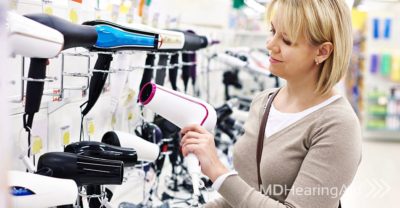While exposure to a sound of 120 dB or more can cause instant damage, noise-related hearing loss often comes from a lifetime of exposure to loud noises. However, preventing hearing loss is possible by following a few easy-to-remember guidelines.
How hearing loss works
Age-related hearing loss is mostly caused by damage to the tiny hair cells of the inner ear. When these cells are damaged, hearing sensitivity decreases. These cells are not able to grow back and recover from damage, and thus hearing loss is permanent.
If you leave a noisy area and hear a ringing in your ears (tinnitus) or feel fullness in your ears, you may have suffered hearing damage.
Protect your hearing at work
OSHA regulations require that workers exposed to an average noise level of 85 dB or higher must be provided with hearing protection. However, noise-related hearing loss is one of the most common work-related illnesses in the United States, according to the CDC.
Construction and entertainment are the most dangerous industries when it comes to hearing loss, as workers are exposed to loud noises for extended periods of time. Those working in construction can take precautions by wearing protective earmuffs or earplugs that partially or completely block out sound. Musicians, as well as other entertainment professionals who must listen to the sounds around them rather than block them out, can use protective earplugs that soften sound but still maintain its tonal qualities.
Protect your hearing at home
Just as important as being aware of sound levels at work, it’s necessary to pay attention to how your home appliances can have long-term, harmful effects on your hearing. Vacuum cleaners, blenders, hair dryers, and other loud appliances often come with decibel output levels listed on their packaging. When you’re shopping for a new device, pay attention to which have the highest decibel output and, when possible, pick the quieter option.
To prevent hearing loss from headphones, opt for an over-the-ear set, rather than in-ear ear buds. Headphones that sit over the ear are better at blocking out background noise, which means you can play music at a lower volume. A good guideline to follow is the 60-60 rule – listen at a max of 60% volume for 60 minutes, then give your ears a break.
Protect your hearing at concerts
While long periods of exposure to sounds around 80 dB are damaging, regular attendance to loud concert venues or clubs can be equally harmful to ears. It’s important to use proper protection at concerts, such as disposable earplugs, as well as to give ears a day or so of recovery time after subjecting them to the average 120 dB sound level of a rock concert.
Other causes of hearing loss
Damage due to loud noise is the most common culprit for hearing loss, however there are other threats to keep in mind. Ototoxic medications (or medications that may cause hearing loss) include Aspirin (when taken in large doses, daily), nonsteroidal anti-inflammatory drugs (NSAIDs), antibiotics, loop diuretics, chemotherapy agents, and quinine. The harm that these drugs can do to hearing may be reversible once the medication is discontinued.
Damage to the outer and middle ear can also cause hearing loss, so it is important to use care around the ears. Do not attempt to stick any foreign object in the ear to clean it, such as a cotton swab.
Ear infections, when left untreated, can also cause hearing loss, so do not hesitate to see a doctor if you believe you may have an ear infection, or for any other reason.
Learn how our affordable hearing aids can help treat hearing loss
If you believe you may have hearing loss, consult a physician or an audiologist. An audiologist can help you better understand your hearing loss through a hearing evaluation, which will help you understand which hearing aid may work best for you. If you are experiencing age-related hearing loss, hearing aids can help improve your quality of hearing and, in turn, your quality of life. At MDHearingAid, we offer a variety of digital and analog options – contact us online, or call us at 1-888-670-HEAR (4327) to learn more.
